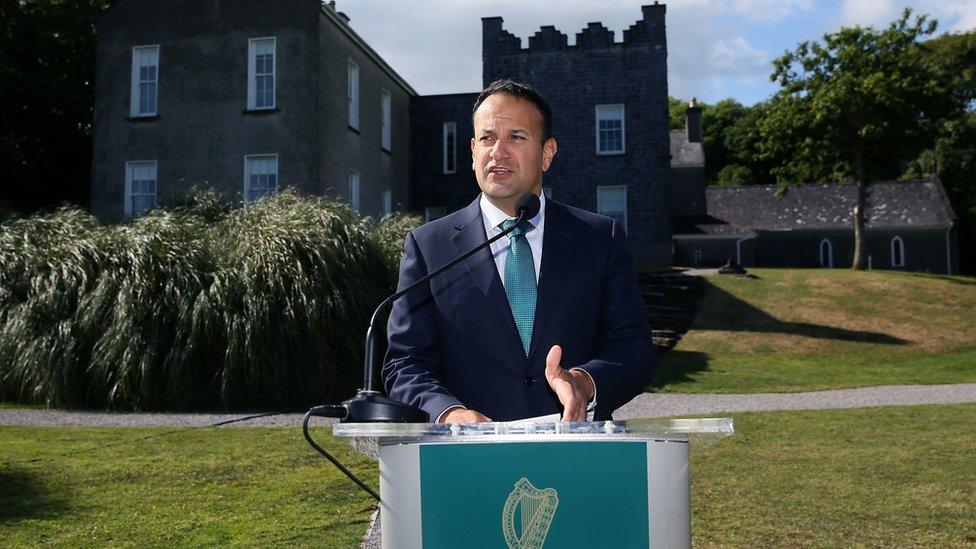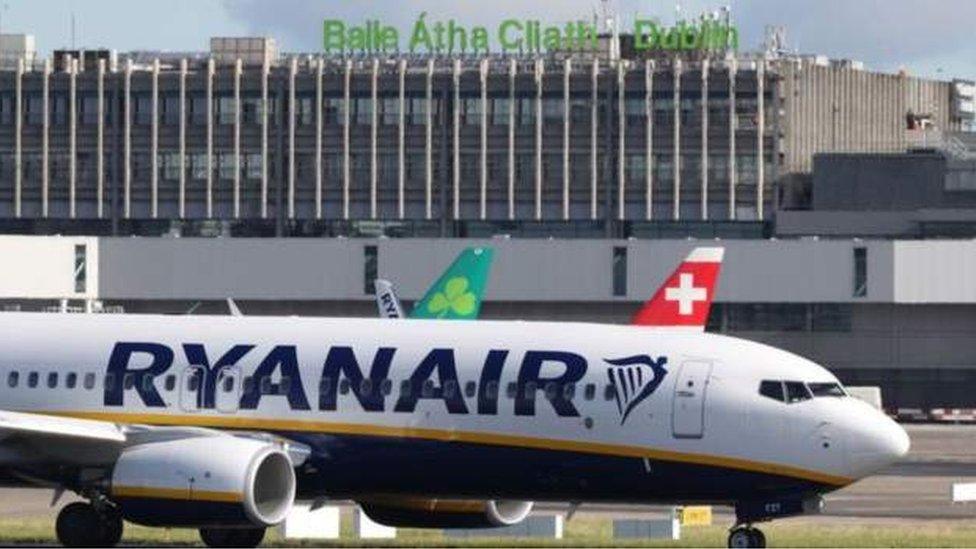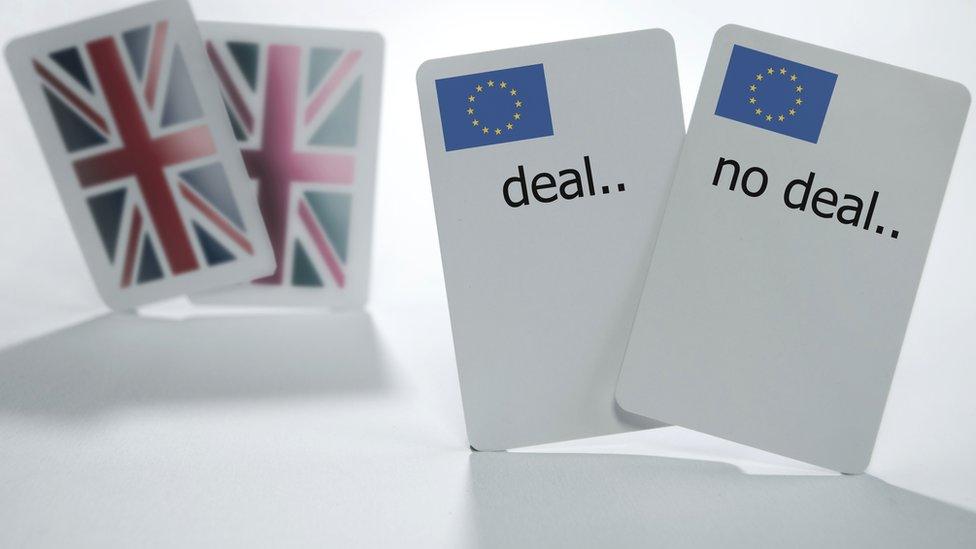Are UK planes to be banned from Ireland post Brexit?
- Published

Leo Varadkar's comments on post-Brexit aviation drew criticism from elements of the British press
There was outcry when it was reported that the Irish prime minister had "threatened to halt British planes landing in Ireland".
The Sun said Taoiseach Leo Varadkar was a "big mouth and a fool".
"It has exposed beyond doubt both his crass naivety and the cynical deceit of the EU masters he cravenly obeys," said an editorial in the paper
But what are the facts in the case?
What did the Taoiseach actually say?
Speaking at a press conference in County Kerry on 18 July, Leo Varadkar said a no-deal Brexit would see Britain leave the Single European Sky programme, which co-ordinates flights in Europe.
"If they want their planes to fly over our sky, they would need to take that into account," he said.
Allow X content?
This article contains content provided by X. We ask for your permission before anything is loaded, as they may be using cookies and other technologies. You may want to read X’s cookie policy, external and privacy policy, external before accepting. To view this content choose ‘accept and continue’.
"The situation at the moment is that the UK is part of the Single European Sky and if they leave the EU they are not.
"And that does mean if there was a no-deal hard Brexit next March, the planes would not fly and Britain would be an island in many ways - and that is something they need to think about."
Is that possible?
Leo Varadkar was wrong to suggest British aircraft would be barred from Irish airspace in the event of a no-deal Brexit, according to Downing Street.
So-called "overflight rights" are guaranteed by international treaties rather than EU membership, said a Number 10 spokeswoman.
The spokeswoman said the UK was confident of reaching a deal that included "aviation access".
"It's wrong to claim that Ireland could simply stop the UK from flying over its land as a result of Brexit.
"The reason we say that is because overflight rights are not guaranteed by the EU, rather by multilateral treaty which both ourselves and Ireland have signed up to."
What's the legal position?
The international treaty referred to by the UK government is the Chicago Convention, external which 52 states signed on 7 December 1944.
It effectively guarantees the right of civil aviation to fly over the air space of signatory states without permission, but not necessarily to land.

As Mr Varadkar talks about "planes flying over our sky", he is probably wrong on that point - and the UK government correct.
However, the real issue would be planes landing and taking off at EU airports if the UK leaves European Single Sky and the European Aviation Safety Agency with no deal to replace their regulations.
Mr Varadkar was speaking in terms of a "no-deal Brexit", while the UK government was responding in terms of reaching a deal.
His "planes would not fly" remark could in theory become a reality if there was no deal, the need for which is tacitly implied in the UK statement.
Was it a threat?
The Sun certainly took Mr Varadkar's comments as a threat, as did some unionist politicians in Northern Ireland.
"Given that the Irish State is dependent on the RAF for its air defence in the event of a terrorist attack it is obviously exceedingly unwise for Varadkar to pompously and arrogantly suggest that Dublin could deny civilian aircraft from the UK access to Irish airspace," said Traditional Unionist Voice leader Jim Allister.
DUP MLA Christopher Stalford countered that the Republic of Ireland gets its gas supply through the UK.
Allow X content?
This article contains content provided by X. We ask for your permission before anything is loaded, as they may be using cookies and other technologies. You may want to read X’s cookie policy, external and privacy policy, external before accepting. To view this content choose ‘accept and continue’.
"Remember this the next time Leo decides to threaten the UK over airspace," he tweeted.
In fact, the Republic of Ireland is on course to get the majority of its gas from Irish sources within the next few years.
However Mr Varadkar was defended on social media by the Irish government's spokesperson on the EU
"To be fair he merely reiterated a factual statement that Philip Hammond also made earlier this year," said Senator Neale Richmond.
What the experts say
Eamonn Brennan, chief executive of the Irish Aviation Authority said as early as February 2017: "Air connectivity all over the world is based on Air Service Agreements and once the UK leaves the EU a new Air Service Agreement will have to be put in place between the EU27 and the UK.
Michael O'Leary, the boss of Ryanair, has repeatedly warned that the UK is running out of time to agree a new open skies agreement with the EU, saying there is a "real prospect" that there will be no flights between the UK and Europe for a period beyond March 2019.
In July 2017, the head of the Aerospace body ADS said that the UK must remain an EU member during a post-Brexit transition period.
Aviation expert Paul Everitt said the UK would struggle to sign the necessary agreements with global safety regulators before then, risking disruption to air travel.
"If we don't have a transition arrangement and if we aren't a member of the EU as part of that transitional arrangement, then we have chaos because we don't have a system to ensure that our products are safe and secure to fly and a regime that is acknowledged around the world," he said.
Theoretically possible - but unlikely
Aviation consultant John Strickland said that in the event of a no-deal Brexit, the current aviation traffic rights framework would no longer apply.
"Theoretically, at midnight on that day planes would be grounded," he said.
But he questioned the likelihood of that happening.
"Even if technically a deal comes to an end it wouldn't be logical that you would just accept that that commercial airline traffic stops just to make a political point because you would be starving the economy," he added.
"Whether you are on the UK side, or the Irish side, or the remain side, or the leave side… I don't see anybody that wins from the suspension of air services."
- Published20 July 2018

- Published28 July 2017